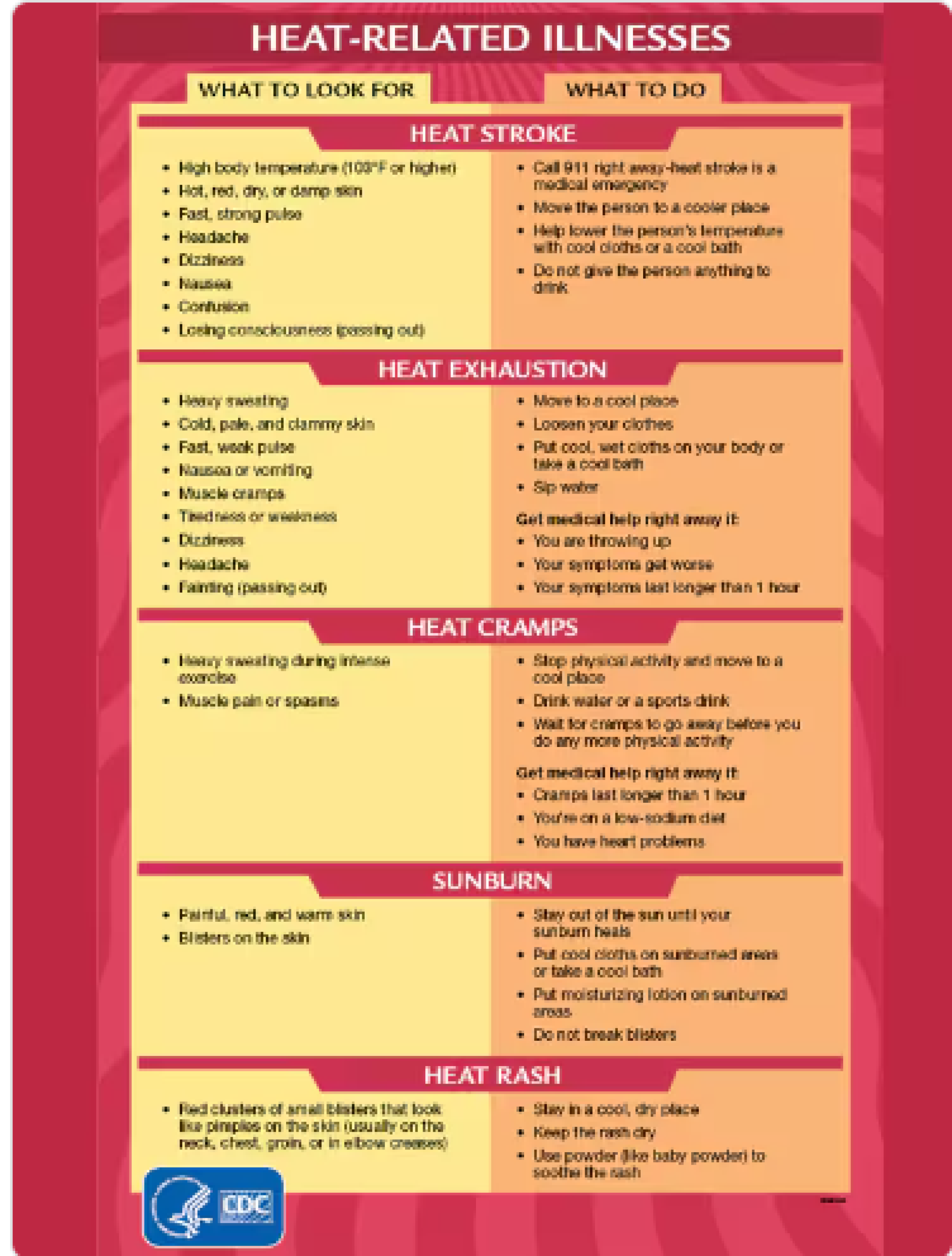
Signs of Heat-related illnesses and how to treat them.
Protect Yourself from Heat Brochure
- Stay hydrated by drinking plenty of fluids, even if you don’t feel thirsty. Avoid alcoholic, or caffeinated beverages.
- Eat more frequent, smaller meals.
- Wear lightweight, loose-fitting, and light-colored clothing.
- Stay indoors and avoid strenuous outdoor activities or exercise, especially during the hottest part of the day.
- If you do not have air conditioning in your home, seek airconditioned public places, especially during the hottest part of the day, such as shopping malls or public libraries.
- If you must work outside, take frequent breaks, work with a partner, and continually check-in with one another to make sure neither of you is starting to show signs of heat stroke or illness.
- Wear sunscreen when outdoors.
- Familiarize yourself with the symptoms of heat-related illness.
Heat Safety Tips for Seniors in Your Community
Seniors are more vulnerable to extreme heat, as their bodies are less able to process severe changes in temperature, especially if they are taking certain medications. In addition to the tips above, seniors in your community should take the following precautions:
- Drink sweat-replacement products that contain potassium and salt.
- Stay in contact with friends, family members, and caregivers to let them know you’re safe.
- If you start to feel ill, call for medical assistance immediately.
- Stay indoors, but if you do have to be outside for any length of time, wear sunscreen, a hat, and sunglasses.
Heat Safety Tips for Children in Your Community
- Children should never be left alone in an enclosed vehicle on hot days.
- Keep infants under six months out of the sun. They should also be dressed in cool, comfortable clothing, and should wear a hat with a brim.
- Make sure children are taking frequent water breaks during play.
- They should be hydrating every 15 to 20 minutes.
- Children out of school during summer months will be looking to get active. Plan indoor activities for them to keep them inside the air conditioning.
- Ask your doctor if medications you are taking could be rendered less effective if stored in a home without air conditioning on hot days.
Heat Safety Tips for Pets in Your Community
- Pets should never be left alone in an enclosed vehicle on hot days.
- Make sure pets have access to clean, fresh water throughout the day.
- Keep your pets indoors where it’s air-conditioned, even if they typically spend a lot of time outside.
- Learn how to identify symptoms of overheating in your pet. Click this link to learn the signs.
- Avoid taking your pet outside between the hours of 11 a.m. and 4 p.m.
- Remember that paved surfaces can become extremely hot, so avoid walking your dog on hot surfaces, including your driveway or deck.
- Keep your pet well-groomed, especially if it has a naturally thick coat.
Information courtesy of CIVICREADY Mass Notification System A Public Safety Officer's Comprehensive Guide to Natural Disaster Preparedness and Emergency Communications.
Visit Ready Iowa for more information.
Extreme Heat Safety Handout (pdf)
Other News
CERT Meeting
posted 8/1/25
School Preparedness
posted 7/30/25
Jasper Ready App
posted 11/5/24
Alert Iowa Sign Up
posted 6/21/22
